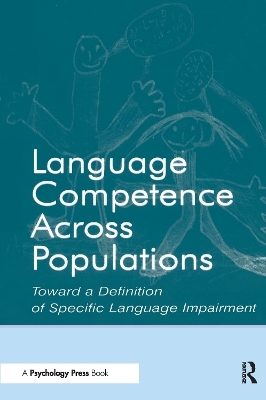
Language Competence Across Populations
Psychology Press Ltd (Verlag)
978-0-415-65536-1 (ISBN)
This unique, edited book bridges studies in language disorders and linguistic theory with timely contributions from leading scholars in language development. It presents an attempt to define Specific Language Impairment, relating it to children of normal and disordered language capabilities.
The chapter presentations examine language development across a variety of populations of children, from those with Specific Language Impairment to second language learners. The contributors discuss criteria for the definition of SLI, compare and contrast SLI with profiles of children with other disorders and dialects, and offer a comprehensive look at the Whole Human Language, which ties together spoken and signed languages.
Methodological concerns that affect the credibility and generalizability of the findings are discussed and controversies between opposing linguistic approaches to language acquisition are presented.
The conceptual thread that gradually reveals itself as the chapters unfold is a theoretical issue of central importance to cognitive theory, as well as to our understanding of the biological correlates of language--it concerns the variability that linguistic competence can manifest in children under different biological conditions and life circumstances.
Language Competence Across Populations: Toward a Definition of Specific Language Impairment is an essential volume for advanced students and scholars in linguistics and psychology who have an interest in language acquisition and language disorders, as well as for the clinical professionals dealing with children with language impairments.
Yonata Levy, Jeannette C. Schaeffer
Contents: Y. Levy, J. Schaeffer, Preface. Part I:Language Competence Across Populations.Section 1:The Characterization of Specific Language Impairment.J. Schaeffer, An Introduction. K. Wexler, Lenneberg's Dream: Learning, Normal Language Development, and Specific Language Impairment. M.K. Rice, A Unified Model of Specific and General Language Delay: Grammatical Tense as a Clinical Marker of Unexpected Variation. M. Crago, J. Paradis, Two of a Kind? The Importance of Commonalities and Variation Across Languages and Learners. H.K.J. van der Lely, Do Heterogeneous Deficits Require Heterogeneous Theories? SLI Subgroups and the RDDR Hypothesis. J. Schaeffer, Pragmatics and SLI. J. de Jong, Specific Language Impairment and Linguistic Explanation. D. Ravid, R. Levie, G.A. Ben-Zvi, The Role of Language Typology in Linguistic Development: Implications for the Study of Language Disorders. Section 2:Methodological Concerns.G. Conti-Ramsden, An Introduction. L.B. Leonard, Specific Language Impairment: Characterizing a Deficit. C.B. Mervis, B.F. Robinson, Methodological Issues in Cross-Group Comparisons of Language and/or Cognitive Development. G. Bol, MLU-Matching and the Production of Morphosyntax in Dutch Children With Specific Language Impairment. E. Dromi, L.B. Leonard, A. Blass, Different Methodologies Yield Incongruous Results: A Study on the Spontaneous Use of Verb Forms in Hebrew. Section 3:Language Acquisition in Populations Other than Children With Specific Language Disorders.Y. Levy, An Introduction. H. Tager-Flusberg, Language Impairment in Children With Complex Neurodevelopmental Disorders: The Case of Autism. H. Clahsen, C. Temple, Words and Rules in Children With Williams Syndrome. Y. Levy, Basic Language Skills in Children With Neurodevelopmental Disorders and the Notion of Brain Plasticity. W. Sandler, On the Complementarity of Signed and Spoken Languages. Part II:Toward a Definition of SLI?D. Ben Shalom, Understanding SLI: A Neuropsychological Perspective. J. de Villiers, Defining SLI: A Linguistic Perspective.
| Erscheint lt. Verlag | 7.5.2013 |
|---|---|
| Verlagsort | Hove |
| Sprache | englisch |
| Maße | 152 x 229 mm |
| Gewicht | 453 g |
| Themenwelt | Geisteswissenschaften ► Psychologie ► Allgemeine Psychologie |
| Geisteswissenschaften ► Psychologie ► Biopsychologie / Neurowissenschaften | |
| Geisteswissenschaften ► Psychologie ► Entwicklungspsychologie | |
| Geisteswissenschaften ► Sprach- / Literaturwissenschaft ► Sprachwissenschaft | |
| Medizin / Pharmazie ► Gesundheitsfachberufe ► Logopädie | |
| ISBN-10 | 0-415-65536-6 / 0415655366 |
| ISBN-13 | 978-0-415-65536-1 / 9780415655361 |
| Zustand | Neuware |
| Haben Sie eine Frage zum Produkt? |
aus dem Bereich


